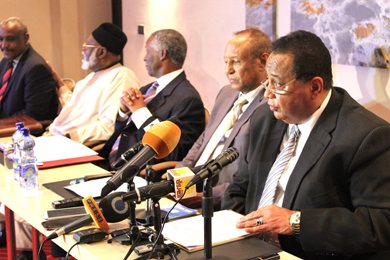Government, SPLM-N still at odds over ways to achieve peace in Sudan
April 25, 2014 (KHARTOUM) – Peace talks between the Sudanese government and the Sudan People’s Liberation Movement-North (SPLM-N) have once again stalled over the failure of the two parties to reach a framework agreement for direct negotiations.

Since Wednesday evening reports emerging from the venue of the talks said the positions of the two delegations are still quite far apart. The SPLM-N sticks to its demand for a comprehensive process while Khartoum team say there are ready to negotiate a solution for the conflict in South Kordofan and Blue Nile.
In a meeting held on Wednesday, Thabo Mbeki proposed that the two delegations form three commissions to discuss the security arrangements, humanitarian assistance, and political issues related to the Two Areas. Besides that he proposed a fourth panel to discuss the national dialogue process.
The mediator seemingly wanted to bring the two parties to limit their discussions within the framework of his mandate as defined by the African Union Peace and Security Council.
The Sudanese delegation renewed its support to the proposals Mbeki made saying iy was in line with its position.
“We immediately accepted the agenda (proposed by the meditaion) because it deals with the three humanitarian, political and security issues in the Two Areas and the national dialogue in Sudan,” said Ibrahim Ghandour, the head of the Sudanese government delegation after the joint meeting.
Ghandour told reporters that they agreed to task the mediation to draft a new paper including the outcome of the meeting and the draft framework agreement of 18 February. He further said they refused a proposal by the SPLM-N to include Darfur region in the agenda of the talks, and that the mediation endorsed their position.
However, in a statement extended to Sudan Tribune on Wednesday, the SPLM-N spokesperson, Abdel Rahman Ardol, reaffirmed that his group sticks to the comprehensive solution and the “National constitutional dialogue” after agreeing on the conditions creating a conducive environment in the country.
Ardol further pointed out they proposed that the four commissions can only start their meetings after reaching a framework agreement, stressing that “it would be difficult for these commissions to work without reference points included in the framework agreement”.
The rebel official went to say they can accept that the political and security commissions engage in negotiations on the basis of the 28 June 2011 agreement, pointing out that Ghandour has accepted this condition.
“The SPLM-N SPLM reitrated that the political commission cannot start its activities without an agreement on the principles and roadmap of the national constitutional dialogue. This deal should also lead to a comprehensive cease-fire from Darfur to the Blue Nile including the South Kordofan,” the rebel spokesperson said.
The rebel group says they want to ensure that the ruling National Congress Party (NCP) will not control the inclusive political process of national dialogue, and that its outcome would lead to a national transitional government not dominated by the ruling party.
Regarding the humanitarian panel, the rebel groups have demanded it take into consideration a ceasefire deal for the the Nuba Mountains struck by the Sudanese government and SPLM-N in 2002.
In accordance with the agreement brokered by Swiss-US mediators and signed in Bürgenstock, Switzerland, on 19 January 2002, the parties committed themselves to a renewable six-month ceasefire. Also the SPLM-N had the right to administrate areas where its troops were after their redeployment in line with the signed deal.
Last March, the head of the African Union (AU) mediation team, Thabo Mbeki, suspended negotiations and referred the matter to the AU Peace and Security Council (AUPSC) for guidance, saying the SPLM-N, which demands a comprehensive peace, had refused a draft framework agreement aiming to settle the conflict in the Two Areas.
(ST)
